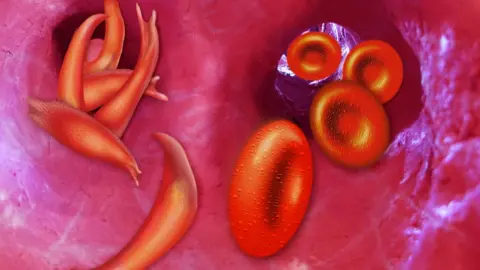MPs find 'serious failings' in sickle cell care
 BBC
BBCA report by MPs has found "serious failings" for patients with sickle cell disease (SCD) in England, including avoidable deaths.
The All-Party Parliamentary Group on Sickle Cell and Thalassaemia says its findings uncovered "near misses".
There was also evidence of racism, with some patients saying they had been racially abused by doctors and nurses.
Sickle cell mainly affects people of African, Caribbean, Middle Eastern, eastern Mediterranean and Asian origin.
Approximately 15,000 people are living with SCD in the UK.
The report was carried out following the death of Evan Smith, 21, who had a sickle cell crisis at North Middlesex hospital in north London in 2019.
A coroner concluded there were a number of failures in his care, and he may have survived if he had been offered a blood transfusion sooner.
"I can't believe we lost him just like that," his mother Betty said.

The group's chairman, Pat McFadden MP, said: "This is a condition that predominantly affects black people and people living with sickle cell feel there is inequality in the way they are being treated.
"No-one wants to put one community above anyone else but they do want equality and treatment, and right now with sickle cell we don't have that."
The report found sub-standard care for sickle cell patients admitted both to general wards and A&E, as well as inadequate training about the condition among healthcare staff.
'Russian roulette'
Kehinde Salami, founder of the charity SickleKan, says he avoids going to hospital.

"I could have a sickle cell crisis and be in considerable pain but choose not to go to hospital because I know it's just going to be a palaver in regards to explaining yourself and getting the treatment that you need.
"For me it's like Russian roulette going into hospital. You don't know if you're going to get good care or bad care and it's something we've been fighting for years."
MPs and health campaigners are calling for major improvements in care for sickle cell patients.
The report has made a number of recommendations including more funding for sickle cell research and better training for healthcare staff.
John James, chief executive of the Sickle Cell Society, said urgent action was needed: "If these failures affected the general Anglo-Saxon population there would be an outcry.
"We must do something. This has gone on for far too long."
Last month, NHS England announced the first treatment for sickle cell disease for more than 20 years, which will be rolled out to thousands of patients.
NHS England said sickle cell treatment had been overhauled, with 10 new specialist centres for the disease being set up across the country.
A spokesperson also said: "While specialist services are central to these improvements, it's also important that each part of the NHS works with patients to improve ongoing care."

What is sickle cell disease?
 Science Photo Library
Science Photo Library- Sickle cell disease is a lifelong condition caused by a faulty gene that affects how red blood cells develop
- It is the fastest-growing genetic disease in the UK, but most cases are in sub-Saharan Africa
- People with sickle cell are often at an increased risk of contracting serious infections or they could become anaemic, which is when red blood cells cannot carry enough oxygen around the body. This can cause tiredness and shortness of breath
- Some patients have regular blood transfusions - usually every three to four weeks - as a form of treatment for the condition.
- A French teenager's sickle cell disease was reversed using gene therapy - a rare and expensive treatment.

